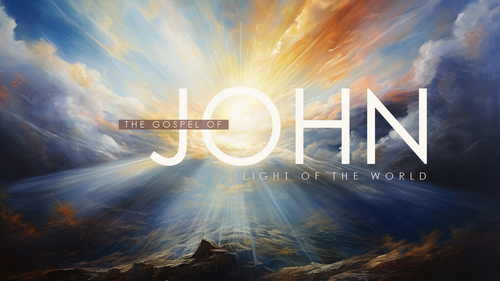John 1:14-18 — The Word Dwelt Among Us

The Incarnation
The term “Incarnation” comes into English from the Latin word incarnatio, meaning “to become flesh.” As stated in John 1:14, “And the Word became flesh and dwelt among us, and we beheld His glory, the glory as of the only begotten of the Father, full of grace and truth.” The doctrine of the Incarnation is a cornerstone of our faith, affirming that Jesus Christ is God the Son who took on humanity. But how can the infinite God take on finite man. Imagine trying to pour the entire ocean into a single glass. It is impossible, yet that is what God did in the incarnation. He poured His infinite glory into the fragile vessel of human flesh. This is the miracle of the incarnation The Church over the years have called this profound mystery, the Hypostatic Union, which describes how Jesus is both fully God and fully man in one Person, with two distinct, unblended natures, both divine and human.
Fully God and Fully Man
In the Hypostatic Union, Jesus’ divine nature and human nature coexist without mixing, changing, or dividing. This means that Jesus is 100% God and 100% man simultaneously. His divine nature includes all the attributes of God, such as omnipotence, omniscience, and omnipresence. His human nature includes all the attributes of humanity, such as the ability to feel pain, hunger, and sorrow.
One Person, Two Natures
Despite having two natures, Jesus is one Person. This unity is crucial because it means that everything Jesus did, He did as one Person. When He performed miracles, it was not just His divine nature at work, but Jesus as a whole. Similarly, when He suffered and died on the cross, it was not just His human nature that experienced pain, but Jesus as a whole. This unity ensures that Jesus’ sacrifice on the cross is sufficient for our salvation because it is the act of the God-man, fully divine and fully human.
Theological and Practical Implications
The Incarnation and the Hypostatic Union have profound implications for Christian theology and practice. They affirm that only Jesus, the God-man, can be the mediator between God and man because He fully represents both. They provide the basis for the Christian understanding of salvation, as only someone who is both fully God and fully man could bridge the gap between a holy God and sinful mankind. But these doctrines are not just theological concepts; they have profound implications for how we live out our faith daily. The practical implications are overwhelming to enumerate. They include God the Son’s ability to relate to our weaknesses, our ability to relate to God and be in His presence, our need to follow in His example of selflessness, and the necessity of obedience to be one with Christ. They encourage us to live a life of humility, service, unity, and obedience, reflecting the character of Christ in all aspects of life.
In summary, the doctrines of the Incarnation and the Hypostatic Union reveal the depth of God’s love and the mystery of His plan for redemption. Jesus Christ, fully God and fully man, stands as the ultimate expression of God’s grace and truth, offering salvation to all who believe.
The term “Incarnation” comes into English from the Latin word incarnatio, meaning “to become flesh.” As stated in John 1:14, “And the Word became flesh and dwelt among us, and we beheld His glory, the glory as of the only begotten of the Father, full of grace and truth.” The doctrine of the Incarnation is a cornerstone of our faith, affirming that Jesus Christ is God the Son who took on humanity. But how can the infinite God take on finite man. Imagine trying to pour the entire ocean into a single glass. It is impossible, yet that is what God did in the incarnation. He poured His infinite glory into the fragile vessel of human flesh. This is the miracle of the incarnation The Church over the years have called this profound mystery, the Hypostatic Union, which describes how Jesus is both fully God and fully man in one Person, with two distinct, unblended natures, both divine and human.
Fully God and Fully Man
In the Hypostatic Union, Jesus’ divine nature and human nature coexist without mixing, changing, or dividing. This means that Jesus is 100% God and 100% man simultaneously. His divine nature includes all the attributes of God, such as omnipotence, omniscience, and omnipresence. His human nature includes all the attributes of humanity, such as the ability to feel pain, hunger, and sorrow.
One Person, Two Natures
Despite having two natures, Jesus is one Person. This unity is crucial because it means that everything Jesus did, He did as one Person. When He performed miracles, it was not just His divine nature at work, but Jesus as a whole. Similarly, when He suffered and died on the cross, it was not just His human nature that experienced pain, but Jesus as a whole. This unity ensures that Jesus’ sacrifice on the cross is sufficient for our salvation because it is the act of the God-man, fully divine and fully human.
Theological and Practical Implications
The Incarnation and the Hypostatic Union have profound implications for Christian theology and practice. They affirm that only Jesus, the God-man, can be the mediator between God and man because He fully represents both. They provide the basis for the Christian understanding of salvation, as only someone who is both fully God and fully man could bridge the gap between a holy God and sinful mankind. But these doctrines are not just theological concepts; they have profound implications for how we live out our faith daily. The practical implications are overwhelming to enumerate. They include God the Son’s ability to relate to our weaknesses, our ability to relate to God and be in His presence, our need to follow in His example of selflessness, and the necessity of obedience to be one with Christ. They encourage us to live a life of humility, service, unity, and obedience, reflecting the character of Christ in all aspects of life.
In summary, the doctrines of the Incarnation and the Hypostatic Union reveal the depth of God’s love and the mystery of His plan for redemption. Jesus Christ, fully God and fully man, stands as the ultimate expression of God’s grace and truth, offering salvation to all who believe.
Posted in Gospel of John
Recent
Habakkuk 1:12–2:1— Appealing to the Throne of God
February 13th, 2026
Habakkuk: Trusting God in Troubled Times
February 6th, 2026
John 20:18–31 — Believing is Seeing
January 16th, 2026
John 20:1–17 — Love Turns Grief into a Mission
January 10th, 2026
John 17:20–26 — Jesus Prayer for All Believers
December 5th, 2025
Archive
2026
2025
October
2024
February
March
April
May
July
October
November
December
Advent 2024 Devotion: December 2Advent 2024 Devotion: December 3Advent 2024 Devotion: December 4Advent 2024 Devotion: December 5Advent 2024 Devotion: December 6John 3:16-21 — For God So Loved the WordAdvent 2024 Devotion: December 7Advent 2024 Devotion: December 8Advent 2024 Devotion: December 9Advent 2024 Devotion: December 10Advent 2024 Devotion: December 11Advent 2024 Devotion: December 12Advent 2024 Devotion: December 13Advent 2024 Devotion: December 14Advent 2024 Devotion: December 15Advent 2024 Devotion: December 16Advent 2024 Devotion: December 17Advent 2024 Devotion: December 18Advent 2024 Devotion: December 19Advent 2024 Devotion: December 20Advent 2024 Devotion: December 21Advent 2024 Devotion: December 22Advent 2024 Devotion: December 23Advent 2024 Devotion: December 24Advent 2024 Devotion: December 25
2023
January
February
March
April
May
